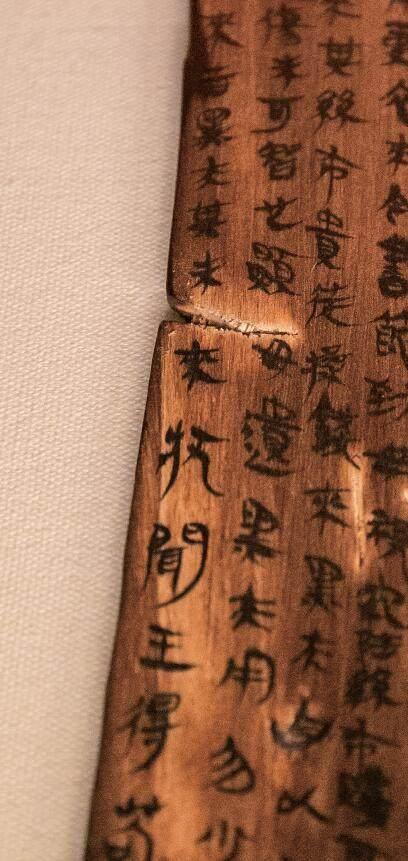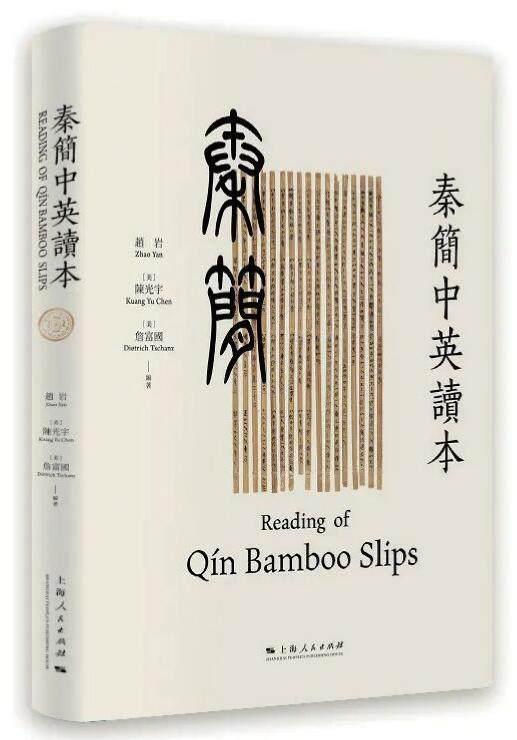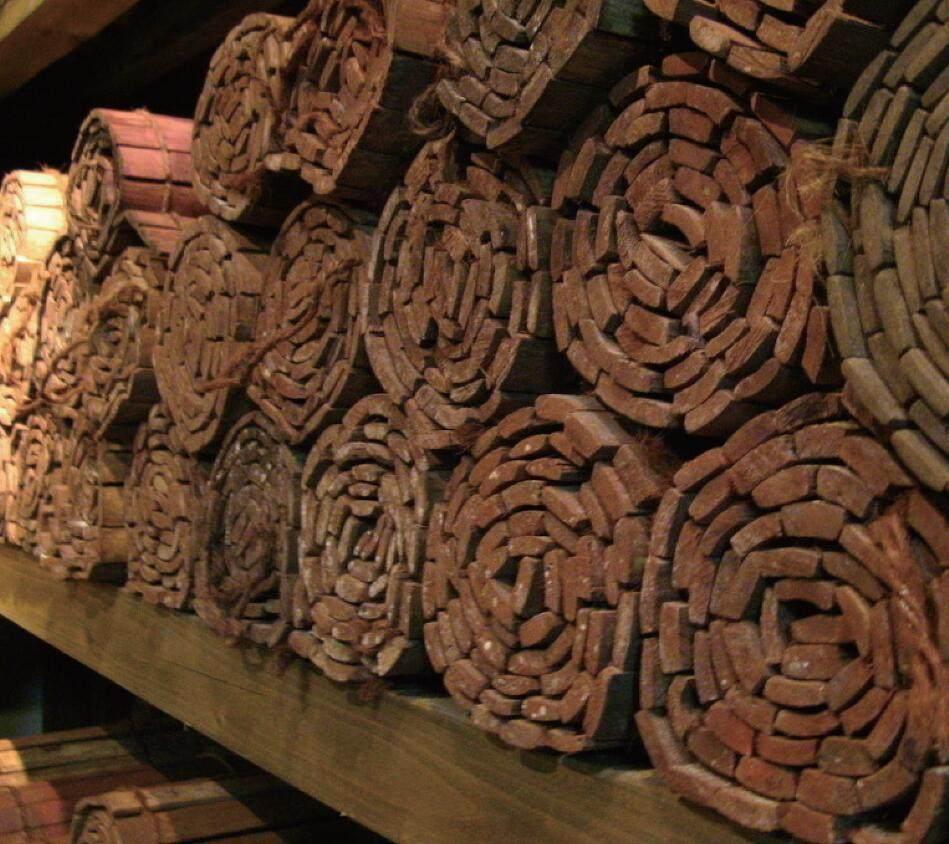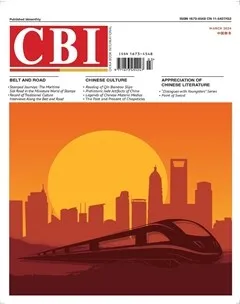Reading of Qin Bamboo Slips



This book contains a total of 44 articles in 16 groups of Qin bamboo slips, through the interpretation of characters, words, sentence analysis, chapter identification, and interpretation of literary meaning, the original esoteric and difficult documents are dismantled layer by layer, and the relevant historical background is introduced, in an effort to enable readers to obtain a complete background of knowledge needed to understand Qin bamboo slips.
This book can not only be used as a textbook for teaching ancient characters in English, but also provides a rare window for readers at home and abroad to learn ancient characters and understand Qin civilization.
Reading of Qin Bamboo Slips
Edited by Zhao Yan, Kuang Yu Chen, Dietrich Tschanz
Shanghai Peoples Publishing House
January 2024
178.00 (CNY)
Zhao Yan
Zhao Yan, PhD, is an associate professor and doctoral supervisor at the School of Liberal Arts, Northeast Normal University, with research interests in philology and Chinese history. He has presided over a number of projects funded by the National Social Science Foundation of China and the China Postdoctoral Science Foundation.
Kuang Yu Chen
Kuang Yu Chen is a professor in the Department of East Asian Studies at Rutgers University in New Jersey and a trustee of the Confucius Institute at Rutgers University. He is engaged in the teaching of oracle bone inscriptions and the study of the origin of Chinese under the tutelage of oracle bone writer Jin Xiangheng.
Dietrich Tschanz
Dietrich Tschanz holds a PhD in Chinese Literature from Princeton University, assistant dean of Rutgers University in New Jersey, and program advisor for Confucius Institute at Rutgers University, where he teaches Chinese Language and Literature courses at the University Chinese of Zurich, the University of Pennsylvania, and Rutgers University.
Group 12: Statutes and Decrees Introduction
In the Qin Dynasty, statutes (lǜ 律) and decrees (lìng 令) were two different but interrelated types of legal documents. So far, such legal documents have been found in Shuihudi Qin tomb 11 bamboo slips, bamboo slips unearthed from Qin tomb 6 at Longgang, and the Yuelu Academy corpus of Qin slips. In the Eighteen Kinds of Qin Laws (Qin lǜ shí bā zhǒng秦律十八種) unearthed from Shuihudi, there are 19 kinds of statutes: Statutes on Agriculture (tiánlǜ 田律), Statutes on Stables and Royal Park (jiùyuàn lǜ 厩苑律), Statutes on Warehouses (cānglǜ 倉律), Statutes on Finance (jīnbù lǜ 金布律), Statutes on Passes and Markets (guānshì lǜ 關市律), Statutes on Government Service (yáolǜ 徭律), Statutes on the Establishment of Officials (zhìlì lǜ 置吏律), Statutes on Checking (xiàolǜ 效律), Statutes on Food Rations at Conveyance Stations (chuánshí lǜ 傳食律), Statutes on the Forwarding of Documents (xíngshū lǜ 行書律), etc. In the Qin Statute Miscellany (Qinlǜ záchāo 秦律雜抄) unearthed from Shuihudi, we can also see names of other statutes including Statutes on Staff Appointment (chúlì lǜ 除吏律), Statutes on Enrollment (fùlǜ 傅律), etc. There are other statutes in the Yuelu Academy corpus of Qin slips: Statutes on Emergency Troops (bēnjǐng lǜ 奔警律), Statutes of the Commandant and Accessory (wèizú lǜ 尉卒律), Statutes on Assault (zéilǜ 賊律), Statutes on the Composition of Judgments (jùlǜ 具律), etc. Qin decrees or orders recorded in bamboo slips include Decrees to Officials with a Salary of 2000 Dan in Capital Area and Commandery (Nèishǐ jùn èrqiān dàn guān gònglìng 內史郡二千石官共令), etc. The Qin decrees have certain common features, such as: some begin with “the order said,” some begin with “someone stated,” and most of them are numbered.
Statutes on Agriculture
In the second month of spring, [one is] not allowed to cut timber in the forests or block watercourses. In the summer, [one is] not allowed to burn weeds to make ashes, to collect living young animals, eggs or fledglings. One should not poison fish or tortoises or arrange pitfalls and nets. In the seventh month, [these prohibitions] are lifted. Only when someone has met an unfortunate death, people may cut timber for the inner and outer coffins, in spite of seasons restrictions. People who live in the town near the royal pasture and ranch for keeping horses and cattle and the other kind of royal park, were forbidden to take hunting dogs to hunt when animals breed. When dogs of the commoners enter the royal Forbidden Garden without chasing and catching animals, [one] should not kill them; those that pursue and catch animals are to be killed. Dogs killed by the wardens in the guarded Forbidden Garden are to be handed over to the authorities intact; those that are killed in other forbidden ranches may be eaten, but the skin is to be handed over.
Statutes on Staff Appointment
If [Chief Official of the County] recommends anyone who has been dismissed from the public office as junior officials, he will be fined with two pieces of armor. In the event of dispatchment due to outside public duties [e.g., war, public construction or other undertakings], the office vacancies will be filled by those at the level above the Shangzao rank, in the capacity as acting Bailiff or acting Assistant. If not following this rule, [the one who is appointed] will be fined with two pieces of armor. [A County Commandant] who does not follow the rule to appoint Sergeant Major and Bailiff of the Crossbowmen, or if the archer fails the test, [the County Commandant] will be fined with two pieces of armor. Bailiff of the Crossbowmen who fails the test will be punished with two pieces of armor and fired. [The County Chief] should take a joint liability and responsibility. Four years after been appointed as the horse cart driver for superiors, and the driver is still not competent, the horse cart trainer will be fined with a piece of shield, and the driver will be fired and charged and punished with four years of corvee labor and military servitude.
Orders on Adoption
Governor of Taishan Commandery reported: New citizens with merit rank of Bugeng (“Service-Rotation Exempt”) like Chang and his wife committed theft and robbery. They were punished by removing beard and hardwork of collecting fire wood, and sifting rice. [By law] their children should be taken into government custody [as laborers or slaves], but some are too young to do labor work and cannot earn their own livelihood. They should not be sent away, otherwise they may perish on the road. Judgement: Order them to be adopted by their parents and relatives, do not send them away. Judgement by the Chief Minister: Children [of criminals] under the age of eight years old, shall be adopted by their parents and relatives. [Children] over eight will be transferred according to the law. [This order] is equally applicable to Langya Commandery.
Orders on Criminal Concealment
The order said: During routine inspections of the County Administration, if the County Office dares to hide facts from the inspection team or attempts to block or suppress the information or communication channels, [County Officials] will be subject to the penalty named nai (beard removal). If the crime committed hidden corresponds to banishment or even more serious than nài, [they] will be convicted accordingly with an additional level of severity.

